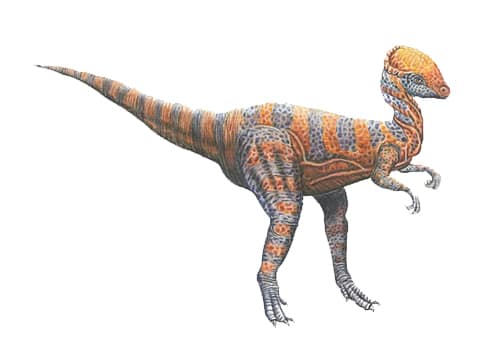Goyocephale


Name: Goyocephale
Pronounced: goy-oh-keff-ah-lee 
Meaning: Adorned head
Type: Large Theropod
Length: 2 meters long
Diet: Herbivore
Period: Late Cretaceous
Years: 81-75 million years ago
Location: Mongolia
Description: Goyocephale is a genus of small, herbivorous dinosaur that lived during the Late Cretaceous Period, about 75-70 million years ago. It was a member of the pachycephalosaurid family of dinosaurs, which are known for their thick, domed skulls. Goyocephale was a small dinosaur, with a body length of only about 1.5-2 meters (5-6.5 feet) and a weight of around 20-30 kilograms (45-65 pounds). It had a short, stocky build, with a wide, rounded skull and a short, thick neck. Its front legs were shorter than its hind legs, and it likely walked on all fours. Goyocephale is known from several well-preserved fossils that have been found in Asia, particularly in Mongolia and China. These fossils include complete skulls and partial skeletons, as well as isolated bones and teeth. Goyocephale is important because it is one of the best-known and most thoroughly studied of the pachycephalosaurid dinosaurs, and has helped scientists to understand the anatomy, behavior, and ecology of these dinosaurs. Goyocephale was a herbivorous dinosaur that likely fed on a variety of plants, including conifers, ferns, and cycads. It may have used its thick, domed skull to defend itself from predators or to fight with other members of its own species. Despite its small size, Goyocephale was probably well-equipped to survive in its ecosystem, and would have faced competition from other herbivorous dinosaurs such as hadrosaurs and ceratopsians.
Loading images from Wikipedia
Loading a Random Dinosaur...


